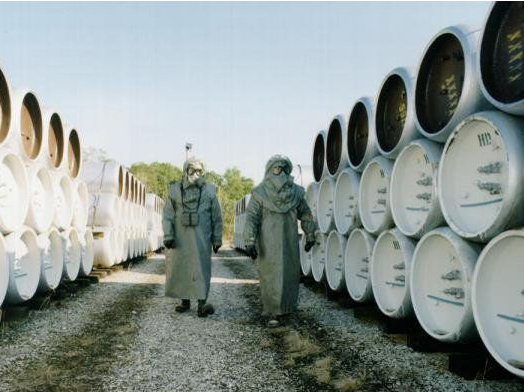Western members of the U.N. Security Council on Thursday voiced concerns about ambiguities and discrepancies in Syria's original declaration of its poison gas arsenal that Damascus submitted last year to a global chemical arms watchdog, diplomats said.
Those worries surfaced during a closed-door meeting of the 15-member council with Sigrid Kaag, head of the joint mission of the United Nations and Organization for the Prohibition of Chemical Weapons (OPCW) that is overseeing the destruction of Syria's toxic weapon stockpiles, Al Arabiya reported.
"Some council members were expressing concerns about unanswered questions on the declaration and stressed the need to get to bottom of discrepancies," a council envoy told Reuters.
Diplomats said the delegations that raised those suspicions during the meeting included Britain, France and the United States, which believe Syrian President Bashar al-Assad never came clean about the full extent of his chemical arsenal despite his promises to destroy the entire program.
They also expressed unease that Syria has yet to destroy 12 facilities it had previously used to produce chemical arms, diplomats said.
During the meeting, diplomats said Russian Ambassador Vitaly Churkin praised Assad's government's cooperation with Kaag's mission, while U.S. Ambassador Samantha Power, French Ambassador Gerard Araud and British envoy Peter Wilson condemned the recent chlorine gas attacks, which the West blames on Assad's forces.
The three Western envoys also declared support for the OPCW investigation into the chlorine gas attacks.
Under threat of U.S. airstrikes, Assad agreed with the United States and Russia in September to dispose of his chemical weapons - an arsenal that Damascus had never formally acknowledged - after hundreds of people were killed in an August attack with the nerve agent sarin on the outskirts of Damascus.
Washington and its Western allies said it was Assad's forces who unleashed the sarin attack, the world's worst chemical strike in a quarter century. The government blamed the rebel side in Syria's civil war, which is now in its fourth year.
Meanwhile, a senior Israeli military officer told reporters in Jerusalem on Thursday that Israel agreed with the assessment of Western intelligence agencies that Syria has maintained a small chemical weapons capability that it did not disclose to the OPCW.
"We share the same assessments," he said. "I don't want to get into percentages, but ... our assessment is that the Syrians will preserve a low residual capability. My assessment is that this is focused in one area, which is nerve gas."
Regarding suspected discrepancies in the Syrian declaration, Kaag told reporters that a number of council members made clear they will want the U.N.-OPCW mission to continue working even after Assad's government has shipped 100 percent of its declared chemical weapons materials outside of the country.
"That's a question for the Security Council to answer," Kaag said when asked if she wanted the mission to keep working. "A number of member states have indicated in the council that they consider the overall elimination of the entire program (necessary) ... for the mission to be over."
Syria denies concealing parts of its poison gas program from the U.N.-OPCW mission and has said that after its declared stockpiles are removed, the joint mission should disband. But Western officials want the team to keep working.
Britain's Wilson told reporters that "until we have complete confidence that chemical weapons have been removed from use in Syria then the joint mission still has work to do."
France's Araud told the council that Kaag's mission "will have to remain as long as necessary," according to diplomats inside the meeting. Churkin, speaking on behalf of Assad's close ally Russia, called on the opposition not to undermine the removal of the remaining chemical agents.
The Syrian chemical weapons program was to be completely destroyed by June 30. While most of the declared chemicals have been shipped out, the June 30 deadline is unlikely to be met, diplomats say, partly because it will take at least two months for a U.S. ship to destroy the chemicals agents at sea.
Power, council diplomats said, complained to the council about Syria's repeated failure to meet its interim deadlines for shipping its chemicals out of the country.
Kaag said that 92 percent of Syria's chemical stockpile had been destroyed or loaded onto ships at the Mediterranean port of Latakia to be eliminated elsewhere. It was all to have been removed by April 27, a revised deadline that Syria did not meet.
"However, there is concern ... the remaining 8 percent is inaccessible due to the security conditions in country," she said. "It's very important that Syria completes the cycle."
A rebel offensive aimed at easing a government siege east of Damascus has brought fighting close to the site where there remaining 8 percent is located. The remaining chemicals at Sayqal have yet to be delivered to Latakia.
Kaag said that the leftover weapons toxins consisted of 16 containers - five containing so-called "priority 1" precursor chemicals and 11 others with less toxic "priority 2" agents.






